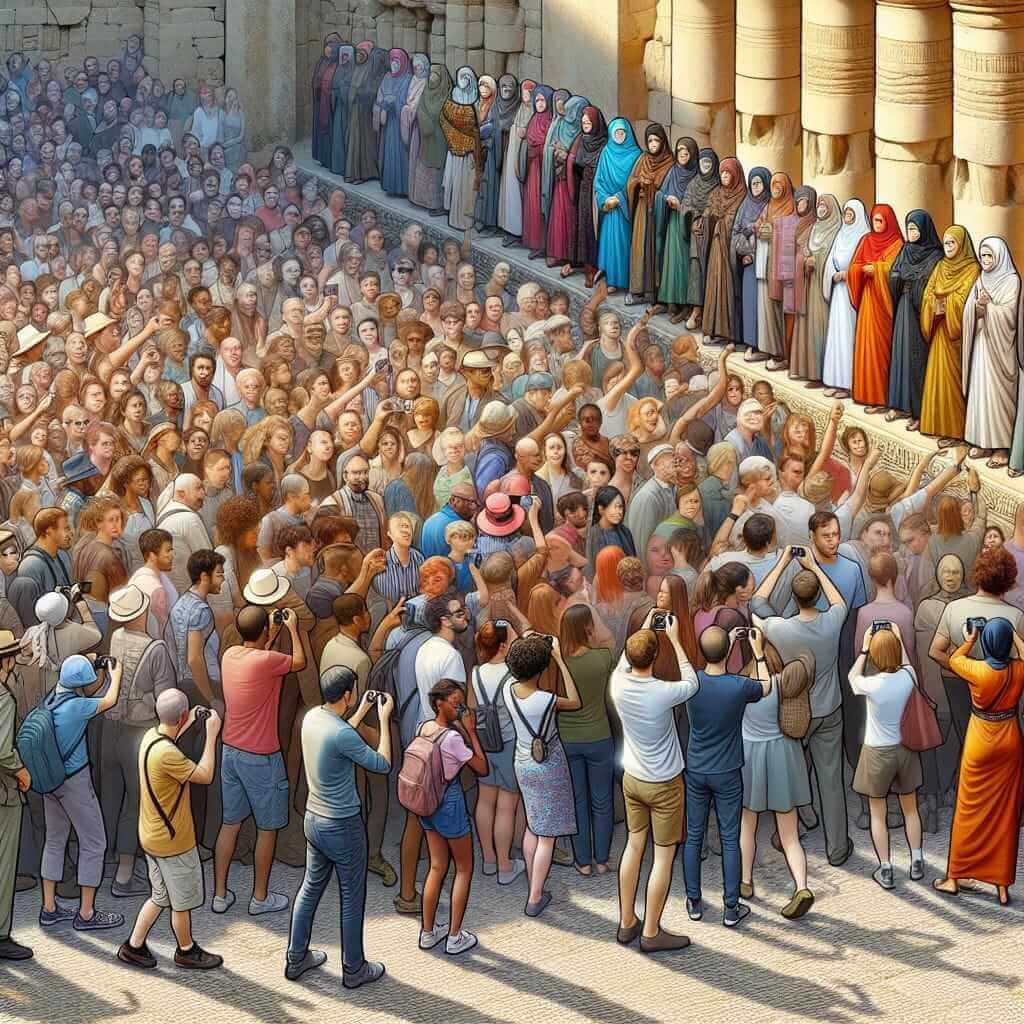The IELTS Reading section tests your ability to understand and interpret written texts on a wide range of subjects. One recurring theme in past IELTS exams is “Cultural heritage and economic development.” This topic often appears because it involves a blend of social, historical, and economic aspects, making it a rich source for generating reading passages. Given its relevance, it’s likely to feature in future IELTS tests as well.
Reading Passage and Questions
Hard Text: Cultural Heritage and Economic Development
Reading Passage
[Please read the following passage carefully and answer the questions that follow.]
Cultural heritage plays a pivotal role in the economic development of a region. It encompasses monuments, traditions, languages, and other cultural forms that have been preserved over time. The nexus between cultural heritage and economic development can be observed in various dimensions such as tourism, employment generation, and social cohesion.
Tourism is often cited as a principal avenue through which cultural heritage promotes economic growth. Historical buildings, traditional festivals, and cultural events attract millions of tourists annually. For instance, the restoration of fortresses and castles in Europe has not only preserved history but also generated significant revenue through tourism. The local crafts and traditional products gain prominence, leading to economic upliftment of artisans and craftsmen.
Another dimension is the creation of job opportunities. Preservation projects and cultural events necessitate the involvement of various professionals, including conservators, tour guides, and event managers. These activities also stimulate allied industries, from hospitality to retail, thereby broadening the job market.
Furthermore, cultural heritage fosters social cohesion and community identity. When communities engage in preserving their heritage, it can lead to a harmonious society that values cooperation and mutual respect. This, in turn, creates a stable environment conducive to economic activities and investments.
However, the relationship is not without challenges. The commercialization of cultural heritage can lead to the commodification of traditions, undermining their authenticity. Additionally, the influx of tourists sometimes exerts pressure on local resources which, if not managed properly, can lead to environmental degradation.
In light of these multifaceted impacts, it is essential to strike a balance. Sustainable tourism practices and community-driven preservation projects have been suggested as effective strategies. Such approaches not only ensure the longevity of cultural assets but also maximize their economic benefits.

Questions
-
Multiple Choice
- The main purpose of the passage is to:
- A) Discuss the drawbacks of cultural heritage.
- B) Highlight the economic benefits of cultural heritage.
- C) Explain the history of cultural heritage.
- D) Describe the role of artisans in cultural heritage.
- According to the passage, what is a significant benefit of restoring historical buildings in Europe?
- A) Reducing unemployment
- B) Generating tourism revenue
- C) Increasing local taxes
- D) Promoting local cuisine
- The main purpose of the passage is to:
-
Identifying Information (True/False/Not Given)
- Tourism is the only benefit derived from cultural heritage. (True/False/Not Given)
- The commodification of traditions can undermine their authenticity. (True/False/Not Given)
-
Summary Completion
Complete the summary using words from the passage.Cultural heritage plays a crucial role in (1) development. It not only promotes (2) through tourism but also generates (3) opportunities. However, this relationship can also face challenges, such as the pressure on local (4). Therefore, sustainable practices are needed to maintain the balance.
Answer Key and Explanations
-
Multiple Choice Answers:
- B) Highlight the economic benefits of cultural heritage.
- Explanation: The passage mainly discusses various economic benefits derived from cultural heritage.
- B) Generating tourism revenue
- Explanation: The passage gives the example of European fortresses generating significant revenue through tourism.
- B) Highlight the economic benefits of cultural heritage.
-
Identifying Information Answers:
- False
- Explanation: The passage mentions other benefits, such as job creation and social cohesion.
- True
- Explanation: The passage explicitly states that the commodification of traditions can undermine their authenticity.
- False
-
Summary Completion Answers:
- economic
- growth
- job
- resources
Common Mistakes in Reading Comprehension
Students often misinterpret the main idea or purpose of the passage, especially when details are abundant. Always refer back to the central theme and the author’s intent. Additionally, vocabulary-specific questions can pose challenges. Regular practice with diverse reading materials can help mitigate these pitfalls.
Vocabulary
- Nexus (noun): /ˈnɛksəs/ – a connection or series of connections linking two or more things.
- Preservation (noun): /ˌprɛzərˈveɪʃ(ə)n/ – the act of maintaining something in its original or existing state.
- Commodification (noun): /kəˌmɒdɪfɪˈkeɪʃən/ – the transformation of goods, services, ideas, or people into commodities or objects of trade.
Grammar Point
- Passive Voice: Used frequently in formal writing, the passive voice can be identified by the formula: subject + form of “to be” + past participle. Example from the passage: Historical buildings are restored.
Additional Resources
For more insights on cultural heritage and its economic impacts, you can visit related articles on our website:
- The Role of Cultural Institutions in Social Development
- The Impact of Cultural Preservation on Community Identity
Conclusion
Improving your reading skills for the IELTS exam requires consistent practice with various texts. Ensuring that you understand the thematic essence of different topics, such as “Cultural heritage and economic development,” can significantly boost your performance. Remember to pay close attention to vocabulary and grammar points, as these are critical for answering questions accurately. Happy studying!